拓展模块Unit3 学案
中职教材英语(拓展模块)教学课件U3

4. Choose the best answers according to the passage.
1. What’s the passage mainly about? A. How to make yourself responsible. B. How to follow your family rules. C. How to get all the privileges. D. How to get your parents’ trust.
education
honest
trouble
problem
enjoy
harmful
understand
2. Listen to the passage. Find out the meanings of the
words and expression, then match them with the
1. What’s the author’s suggestion on gaining parents’ trust?
2. What’s the first thing you need to do when you break the family rules?
How Do I Gain My Parents’ Trust?
Reading and Writing
Text A
1. Learn these words and expressions. prove hang out
responsible
edge sink
consider
ignore
be supposed to
2. Read the passage with these questions in mind.
Module3Unit3导学案外研版英语八年级上册
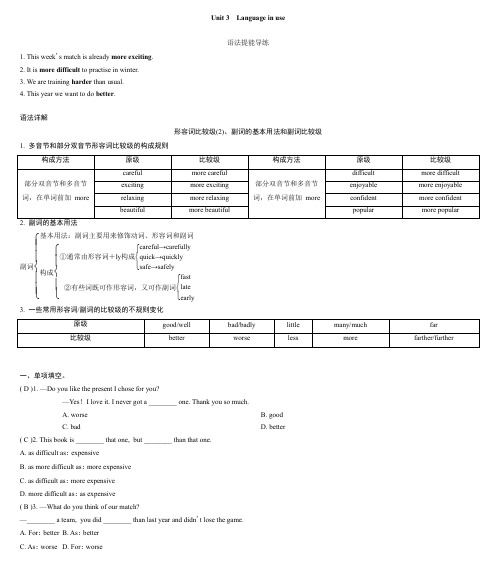
Unit 3 Language in use语法提能导练1. This week 's match is already more exciting .2. It is more difficult to practise in winter.3. We are training harder than usual.4. This year we want to do better . 语法详解形容词比较级(2)、副词的基本用法和副词比较级1. 多音节和部分双音节形容词比较级的构成规则构成方法原级 比较级 构成方法原级 比较级 部分双音节和多音节 词,在单词前加 more carefulmore careful 部分双音节和多音节 词,在单词前加 moredifficult more difficult exciting more exciting enjoyable more enjoyable relaxing more relaxing confident more confident beautifulmore beautifulpopularmore popular2. 副词的基本用法副词⎩⎪⎪⎨⎪⎪⎧基本用法:副词主要用来修饰动词、形容词和副词构成⎩⎪⎨⎪⎧①通常由形容词+ly 构成⎩⎨⎧careful→carefully quick→quicklysafe→safely ②有些词既可作形容词,又可作副词⎩⎨⎧fastlate early3. 一些常用形容词/副词的比较级的不规则变化原级 good/well bad/badly little many/much far 比较级betterworselessmorefarther/further一、单项填空。
( D )1. —Do you like the present I chose for you?—Yes !I love it. I never got a ________ one. Thank you so much. A. worse B. goodC. badD. better( C )2. This book is ________ that one , but ________ than that one. A. as difficult as ; expensiveB. as more difficult as ; more expensiveC. as difficult as ; more expensiveD. more difficult as ; as expensive ( B )3. —What do you think of our match?—________ a team , you did ________ than last year and didn 't lose the game. A. For ; better B. As ; better C. As ; worse D. For ; worse( B )4. He knows only ________ about American history and his sister knows even ________.A. little; moreB. a little; lessC. much; littleD. more; less二、完成句子。
人教新课标模块3Unit3教学设计课件

二) 练习册(Workbook) 1. TALKING 就第二幕的第一场(At the Tailor’s的开头部分)编一段对话。 2. LISTENING 听力内容为第二幕的第二场(At theTailor’s)。 3 & 4 USING WORDS AND EXPRESSIONS
USING STRUCTURES 分别是就本单元的重点单词、词组及语法的一些巩固性练习。
Clemens, narrator, Roderick, Oliver, bet, penniless, nightfall, unpaid, charity, Horace, issue, fake
3. 固定词组(9个) bring up, go ahead, by accident, stare at, account for, on the contrary, take a chance, in rags, as for 功能(functional items) 1.Making requests(请求) Would you please …? I wonder if you’d mind…. May we ask…? Could you…? If you don’t mind, may I …? Please don’t…. 2.Ordering food (点餐) The waiter or waitress’words: Can I help you?/ What would you like…? I’ll take your order in a minute. Are you ready to order, sir/madam?/ Enjoy your meal! Here’s your bill./ Here you are.
中职英语拓展模块-unit-3-练习册答案教学内容
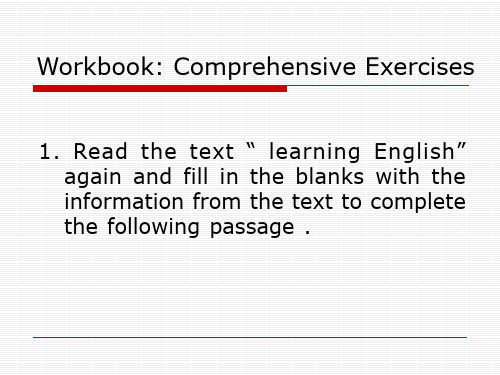
Workbook: Comprehensive Exercises
1. Read the text “ learning English”
again and fill in the blanks with the
information from the text to complete
the following passage .
3. The accident happened at the beginning of this year. 4. Please speak loudly in English. Don’t be afraid of
making mistakes.
5. My brother graduated from Beijing University last year.
grandparent
birthplace
barkershop software
easy-going high-grade full-time
underground overweight overhead underwater
airline
greengrocer
eggplant
firework
V. Writing
6. It took us two days to think it over.
20xx年九年级英语下册Module;3导学案
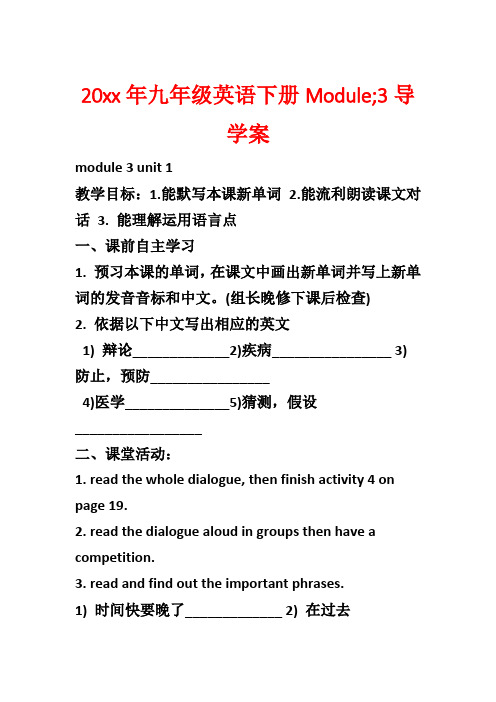
20xx年九年级英语下册Module;3导学案module 3 unit 1教学目标:1.能默写本课新单词 2.能流利朗读课文对话 3. 能理解运用语言点一、课前自主学习1. 预习本课的单词,在课文中画出新单词并写上新单词的发音音标和中文。
(组长晚修下课后检查)2. 依据以下中文写出相应的英文1) 辩论_____________2)疾病________________ 3)防止,预防________________4)医学______________5)猜测,假设_________________二、课堂活动:1. read the whole dialogue, then finish activity 4 on page 19.2. read the dialogue aloud in groups then have a competition.3. read and find out the important phrases.1) 时间快要晚了_____________ 2) 在过去_________________3) 对……了解更多_____________ 4) 在……更擅长_________________5) 预防疾病___________________ 6) 做运动,熬炼__________7) 好得多___________________ 8) 与……一样_________________9) 太多的空余时间_________ 10) 尽某人的实力做____________11〕谈及_________________ 12〕更不安康____________三、语言点归纳1. 翻译以下句子并归纳人们吃得没以前好,运动量没有以前大。
people don’t eat _____________ in the past,and don’t take _______________________ they did.人们不必像50年前那么费劲的工作。
拓展模块Unit3 学案2复习过程
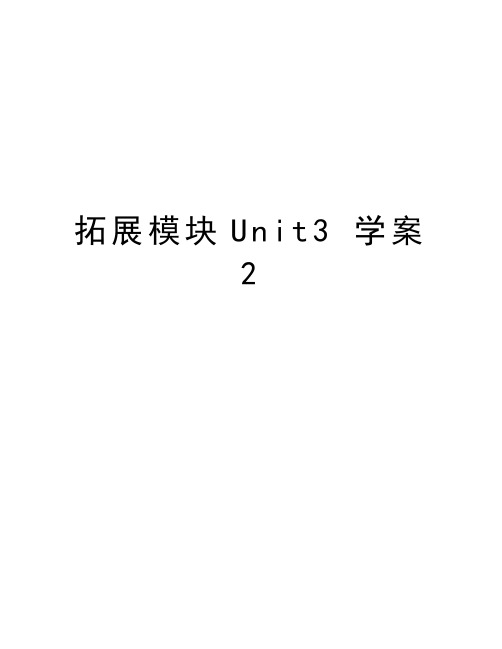
拓展模块U n i t3学案2Unit3 The Birth of Blue Jeans学案(2)主备:李荣荣研备:英语教研组【教师寄语】:Stick to it, and you’ll succeed. 只要人有恒,万事都能成。
【Learning aims】学习目标1.学习和背记, fashion, jeans, normal, uncomfortable等重点单词及相关用法。
2.识记本节课单词表中的单词并能正确朗读和使用。
【Learning Important and Difficult Points】学习重难点1.深入理解课文,掌握文中基础知识,培养快速阅读,整体理解能力。
2.自主学习、探究共赢;掌握对比分析、归纳总结的阅读方法。
【Learning Method Guide】学法指导:reading, remember学习过程:【Warming up】课前热身1.重点单词(英译汉)2.重点短语(英译汉)Many young people like to wear blue jeans. Do you know who made jeans first? And why did he make this kind of trousers?【Thinking】思1.Do you know how blue jeans became popular?2.Do you like to wear blue jeans?3.What is the present fashion in your town.【Discussion】议在预习时,要把课文通读两遍,先(第一轮)通读教材,完成表层理解题,(第二轮)再勾画出文中的疑难点。
1.Decide whether the following statements are T (true) or F (false).( )1. Blue jeans were popular because they were not easily worn out( )2. The design was changed because it was ugly.( ) 3. The nineteen fifties saw very tight jeans.( )4. The style of jeans changes with time.2. Answer the following questions.1. Why do we say we put on a piece of history when we put on blue jeans?_____________________________________________________________________ __________2. What kind of work did Levi Strauss do at that time? Make a guess._____________________________________________________________________ __________3. Could you demonstrate why people felt uncomfortable when they were near the fire? _____________________________________________________________________ __________4.Why do young people like to follow pop or film stars in fashion?______________________________________________________________________________【Show Time】展Key words and useful expressions1.Each time you step into your old jeans, you are putting on a piece of history.每当你双腿伸入你的老式牛仔裤时,你便把一段历史穿上身了。
新外研版九上M3Unit 3 导学案
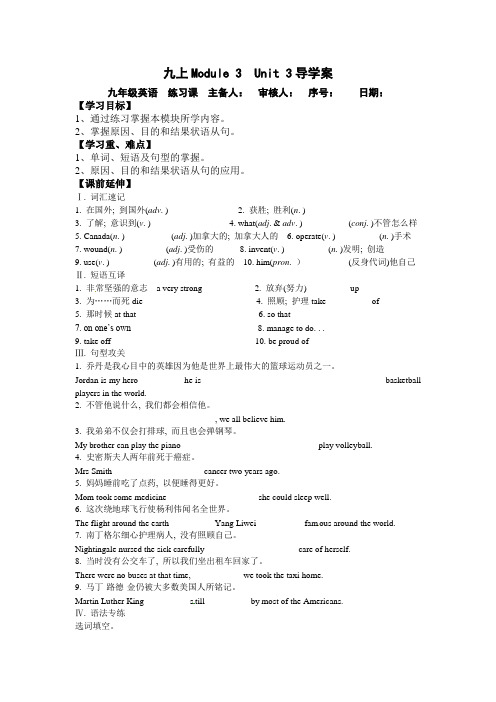
九上Module 3 Unit 3导学案九年级英语练习课主备人:审核人:序号:日期:【学习目标】1、通过练习掌握本模块所学内容。
2、掌握原因、目的和结果状语从句。
【学习重、难点】1、单词、短语及句型的掌握。
2、原因、目的和结果状语从句的应用。
【课前延伸】Ⅰ. 词汇速记1. 在国外; 到国外(adv. )____________2. 获胜; 胜利(n. )____________3. 了解; 意识到(v. )____________4. what(adj. & adv. ) __________(conj. )不管怎么样5. Canada(n. ) __________(adj. )加拿大的; 加拿大人的6. operate(v. )__________(n. )手术7. wound(n. )__________(adj. )受伤的8. invent(v. )__________(n. )发明; 创造9. use(v. ) __________(adj. )有用的; 有益的10. him(pron. )__________(反身代词)他自己Ⅱ. 短语互译1. 非常坚强的意志 a very strong________2. 放弃(努力)__________up3. 为……而死die________4. 照顾; 护理take __________of5. 那时候at that________6. so that______________7. on one’s own______________ 8. manage to do. . .______________9. take off______________ 10. be proud of______________Ⅲ. 句型攻关1. 乔丹是我心目中的英雄因为他是世界上最伟大的篮球运动员之一。
Jordan is my hero __________he is __________ __________ __________ __________basketball players in the world.2. 不管他说什么, 我们都会相信他。
Module3Unit3导学案外研版英语九年级上册

Unit 3Language in use语法练习1.She's my hero because she's one of the best table tennis players in the world, …2.She trained hard, so she became a great player later.3.He wrote books so that they could learn about how he treated the sick.原因、目的和结果状语从句(Ⅰ)分类连词意义及用法例句原因状语从句because “因为”,语气最强,不与so连用He didn't go to school yesterday because he was ill. since “既然;由于”,语气比because弱Since you are free today, you can help me.as “既然”,语气比since弱As it is raining, you'd better take a taxi.目的状语从句so that=in order that=in order to+动词短语“为了”,从句常含有can, could等情态动词He bought a computer so that he could work at home.=Hebought a computer in order that he could work at home.=Hebought a computer in order to work at home.结果状语从句so“所以”,不与because连用The boy couldn't find his mother, so he cried.so+形容词/副词+that二者都表示“如此……以至于”,但名词前有few, little, much, many等修饰时,用so不用such◇He is so clever that we all love him.◇There is so little water that we have to buy some.◇He is such a clever child that we all love him. such+名词(短语)+that …强化训练一、单项填空。
外研八年级下册模块三第三单元导学案
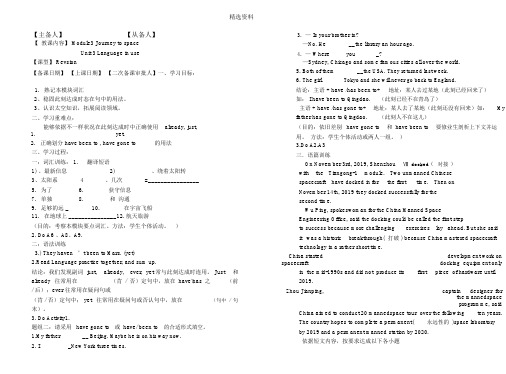
精选资料【主备人】【从备人】【教课内容】 Module3 Journey to spaceUnit 3 Language in use【课型】 Revsion【备课日期】【上课日期】【二次备课审批人】一、学习目标:1.熟记本模块词汇2、稳固此刻达成时态在句中的用法。
3、认识太空知识,拓展阅读领域。
二、学习重难点:1. 能够依据不一样状况在此刻达成时中正确使用 already, just,yet.2. 正确划分 have been to , have gone to 的用法三、学习过程:一:词汇训练: 1. 翻译短语1) 、最新信息2) 、绕着太阳转3、太阳系 4 、几次=________________5. 为了6. 获守信息7. 单独8. 和沟通9. 足够的远 _ 10. 在宇宙飞船11.在地球上 _______________12. 航天旅游(目的:考察本模块要点词汇。
方法:学生个体活动。
)2. Do A6 、A8、A9.二:语法训练3.) They haven’t been to Mars. (yet)2.Read Language practice together, and sum up.结论:我们发现副词 just, already, ever, yet 常与此刻达成时连用。
Just和already往常用在(肯/否)定句中,放在have\has之(前/后);ever 往常用在疑问句或(肯 / 否)定句中; yet往常用在疑问句或否认句中,放在(句中/句末)。
3. Do Activity1.题组二:请采用have gone to或have/ been to的合适形式填空。
1.My father__ Beijing. Maybe he is on his way now.2. I_New York three times.3. — Is your brother in?—No. He __the library an hour ago.4. — Where you _?—Sydney, Chicago and some famous cities all over the world.5. Both of them__the USA. They returned last week.6. The girl Tokyo and she will never go back to England.结论:主语 + have /has been to+地址:某人去过某地(此刻已经回来了)如: I have been to Qingdao.(此刻已经不在青岛了)主语 + have /has gone to+地址:某人去了某地(此刻还没有回来)如:My father has gone to Qingdao.(此刻人不在这儿)(目的:依旧差别have gone to和have been to要修业生剖析上下文并运用。
Module3 Unit3 导学案
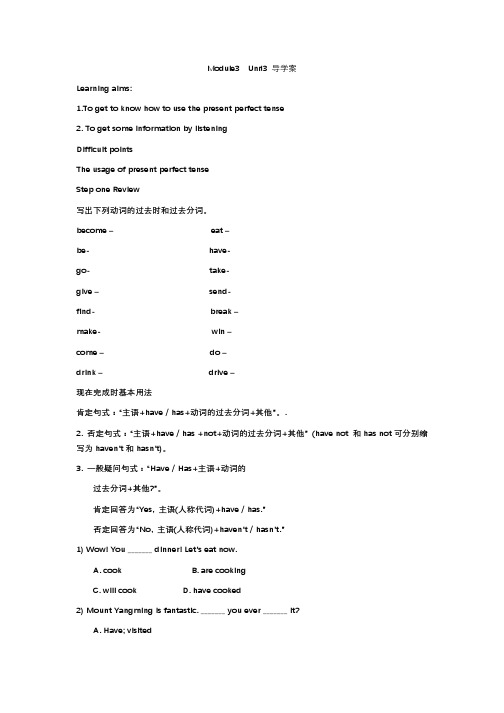
Module3 Unit3 导学案Learning aims:1.To get to know how to use the present perfect tense2. To get some information by listeningDifficult pointsThe usage of present perfect tenseStep one Review写出下列动词的过去时和过去分词。
become –eat –be- have-go- take-give –send-find- break –make- win –come –do –drink –drive –现在完成时基本用法肯定句式:“主语+have / has+动词的过去分词+其他”。
.2. 否定句式:“主语+have / has +not+动词的过去分词+其他”(have not 和has not可分别缩写为haven’t和hasn’t)。
3. 一般疑问句式:“Have / Has+主语+动词的过去分词+其他?”。
肯定回答为“Yes, 主语(人称代词)+have / has.”否定回答为“No, 主语(人称代词)+haven’t / hasn’t.”1) Wow! You _______ dinner! Let’s eat now.A. cookB. are cookingC. will cookD. have cooked2) Mount Yangming is fantastic. _______ you ever _______ it?A. Have; visitedB. Was; visitingC. Do; visit3) —I have seen the film The Jurassic World Ⅱ《侏罗纪世界Ⅱ》. It’s very interesting.—Really? When ____ you _____ it?A. have, seenB. did, seeC. will, see4) —Have you ever been to South Tower Park?—Yes. I ________ there a few months ago.A. wentB. have beenC. have gone二、根据语境及括号内的词语提示完成下列句子或对话。
拓展模块Unit3学案
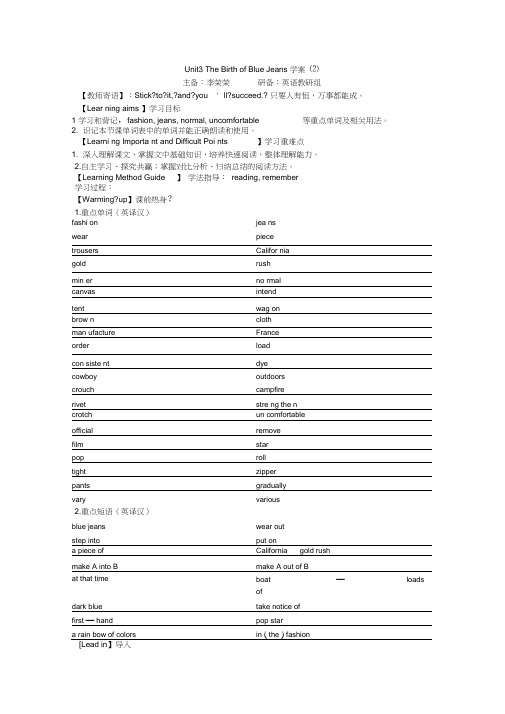
Unit3 The Birth of Blue Jeans 学案⑵主备:李荣荣研备:英语教研组【教师寄语】:Stick?to?it,?and?you ' ll?succeed.? 只要人有恒,万事都能成。
【Lear ning aims 】学习目标1 学习和背记,fashion, jeans, normal, uncomfortable 等重点单词及相关用法。
2. 识记本节课单词表中的单词并能正确朗读和使用。
【Learni ng Importa nt and Difficult Poi nts 】学习重难点1. 深入理解课文,掌握文中基础知识,培养快速阅读,整体理解能力。
2.自主学习、探究共赢;掌握对比分析、归纳总结的阅读方法。
【Learning Method Guide 】学法指导:reading, remember学习过程:【Warming?up】课前热身?1.重点单词(英译汉)fashi on jea nswear piecetrousers Califor niagold rushmin er no rmalcanvas intendtent wag onbrow n clothman ufacture Franceorder loadcon siste nt dyecowboy outdoorscrouch campfirerivet stre ng the ncrotch un comfortableofficial removefilm starpop rolltight zipperpants graduallyvary various2.重点短语(英译汉)blue jeans wear outstep into put ona piece of California gold rushmake A into B make A out of Bat that time boat —loadsofdark blue take notice offirst —hand pop stara rain bow of colors in ( the ) fashion[Lead in】导入Many young people like to wear blue jea ns. Do you know who made jea ns first? And why did he make this kind of trousers?【Thinking】思1. Do you know how blue jeans became popular?2. Do you like to wear blue jeans?3. What is the present fashion in your town.【Discussion 】议在预习时,要把课文通读两遍,先(第一轮)通读教材,完成表层理解题,(第二轮)再勾画出文中的疑难点。
拓展模块unit3 教案
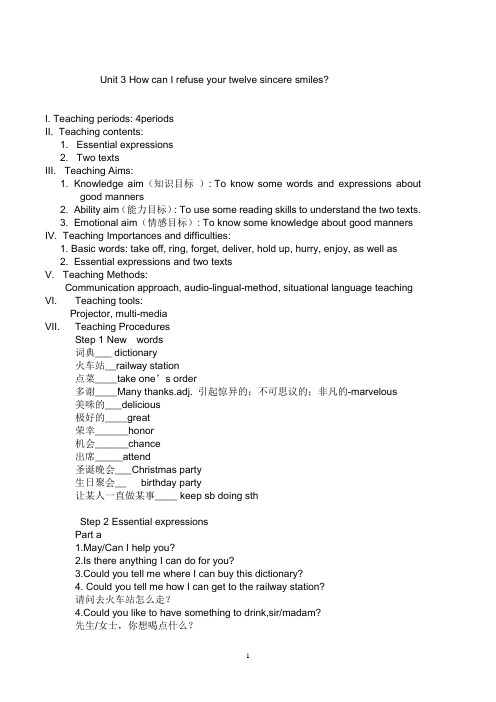
Unit 3 How can I refuse your twelve sincere smiles?I. Teaching periods: 4periodsII. Teaching contents:1. Essential expressions2. Two textsIII. Teaching Aims:1. Knowledge aim(知识目标): To know some words and expressions aboutgood manners2. Ability aim(能力目标): To use some reading skills to understand the two texts.3. Emotional aim(情感目标): To know some knowledge about good manners IV. Teaching Importances and difficulties:1. Basic words: take off, ring, forget, deliver, hold up, hurry, enjoy, as well as2. Essential expressions and two textsV. Teaching Methods:Communication approach, audio-lingual-method, situational language teaching VI. Teaching tools:Projector, multi-mediaVII. Teaching ProceduresStep 1 New words词典___ dictionary火车站__railway station点菜____take one’s order多谢____Many thanks.adj. 引起惊异的;不可思议的;非凡的-marvelous美味的___delicious极好的____great荣幸______honor机会______chance出席_____attend圣诞晚会___Christmas party生日聚会__ birthday party让某人一直做某事____ keep sb doing sthStep 2 Essential expressionsPart a1.May/Can I help you?2.Is there anything I can do for you?3.Could you tell me where I can buy this dictionary?4. Could you tell me how I can get to the railway station?请问去火车站怎么走?4.Could you like to have something to drink,sir/madam?先生/女士,你想喝点什么?5.Would you mind my smoking here?你介意我在这里吸烟吗?6.May I take your order now?你现在可以点菜了吗?7.Would you be able to come to my birthday party?Part b1.Thank you very much./Thanks a lot./Many thanks.2. Thanks. That would be great/marvelous.3. What a delicious meal! Thank you so much.4. Of course not. Make yourself at home.我不介意,请随便。
中职英语(高教社2021)拓展模块Unit3Doing Our Part for

Unit 3 Doing Our Part for the Environment第一、第二课时Listening and Speaking一、教学内容分析本课教学内容选自《英语拓展模块》第三单元“Doing Our Part for the Environment”听说板块(Listening and Speaking)。
本板块内容以环境保护为主题,共有四个短对话和两个长对话听力活动以及两个口头交际活动。
四个短对话分别从空气质量、塑料袋使用、植树、绿色出行等方面呈现了交际内容,目的是激活学生相关的语言知识和生活常识,同时让学生了解环境保护涉及生活的方方面面。
两个长对话的主题分别针对雾霾问题及环境保护举措,旨在训练学生通过听对话获取有关环境问题的信息及理解具体环保措施的能力,也为学生了解环保活动中个人行为的重要性提供了内容载体。
该板块教学内容要求在讨论环境问题与环境保护的语境中,学生能够听懂讨论环境问题和应对措施的对话,根据对话内容概况主人公的环保态度;熟悉描述环境问题的表达,口头简要介绍应对环境问题的措施和垃圾分类的知识;能够与同伴就日常生活中的环保举措进行讨论,体现“从我做起”的环保观念。
二、学情分析环境保护是与学生日常生活紧密相关的话题。
学生基本都有垃圾分类、绿色出行等与环境保护相关的生活经验,因而学生有进行本话题讨论的基础和素材。
同时,学生在基础模块中学习过绿色地球的话题,在了解有关环境问题的信息时,对于环境问题和垃圾分类等信息要素可进行迁移应用,如protect、recycle 等词汇以及“Paper, cans and bottles can be recycled.”和“We can help reduce waste and protect the environment.”等句型。
但学生对于应对环境问题的措施等内容较少进行深入交流,用英文描述更多环保举措还存在表达困难。
同时,学生存在话题词汇量少,自主获取知识和系统总结所学内容的意识较差,课堂上有表达的诉求,但往往受英语知识储备量所限,表达的意愿较弱,英语综合应用能力较弱,因而教师在课堂上通过模拟访谈的方式,由易及难,不断增强学生表达的自信心,提高表达能力。
拓展模块unit3-3
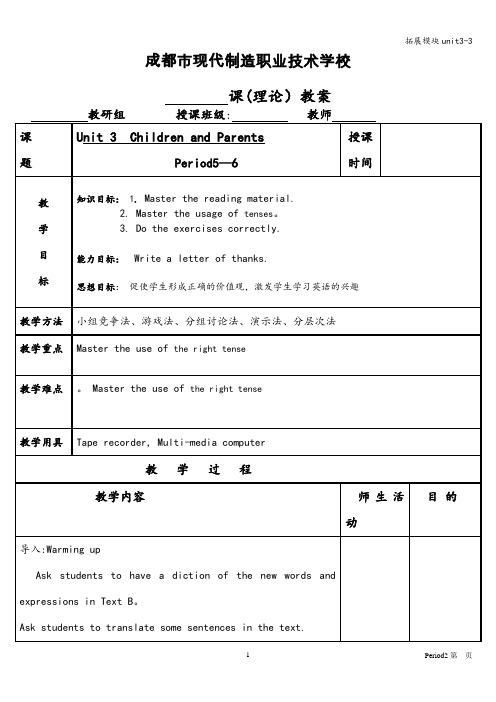
思想目标:促使学生形成正确的价值观,激发学生学习英语的兴趣
教学方法
小组竞争法、游戏法、分组讨论法、演示法、分层次法
教学重点
Masterthe use ofthe right tense
教学难点
。Masterthe use ofthe right tense
Politics is now taught in all schools。现在各学校都开设政治课。
当以ics结尾的学科名词表示“学科”以外的意义时,用作复数。如:mathematics(运算能力),politics(政治观点),economics(经济意义)等。
His politics are his own affair。他持什么政治主张是他自己的事.
教学用具
Tape recorder, Multi-media computer
教 学 过 程
教学内容
师生活动
目 的
导入:Warming up
Ask students to have a diction of the new words and expressions in Text B。
Ask students to translate some sentences in the text.
有些用来表示由两个对应部分组成一体的名词复数(trousers, glasses, shoes, shorts, scissors, scales等)作主语时,前面若有“一条”、“一副”、“一把”之类的数量词,动词用单数;若没有数量词或数量词是复数,则谓语动词用复数.还有一些以s结尾的名词通常用复数:arms(武器), clothes, contents, minutes(记录), remains(遗体), thanks等。
- 1、下载文档前请自行甄别文档内容的完整性,平台不提供额外的编辑、内容补充、找答案等附加服务。
- 2、"仅部分预览"的文档,不可在线预览部分如存在完整性等问题,可反馈申请退款(可完整预览的文档不适用该条件!)。
- 3、如文档侵犯您的权益,请联系客服反馈,我们会尽快为您处理(人工客服工作时间:9:00-18:30)。
Unit3 The Birth of Blue Jeans学案(2)主备:李荣荣研备:英语教研组【教师寄语】:Stick?to?it,?and?you’ll?succeed.?只要人有恒,万事都能成。
【Learning aims】学习目标1.学习和背记, fashion, jeans, normal, uncomfortable等重点单词及相关用法。
2.识记本节课单词表中的单词并能正确朗读和使用。
【Learning Important and Difficult Points】学习重难点1.深入理解课文,掌握文中基础知识,培养快速阅读,整体理解能力。
2.自主学习、探究共赢;掌握对比分析、归纳总结的阅读方法。
【Learning Method Guide】学法指导:reading, remember学习过程:【Warming?up】课前热身?1.重点单词(英译汉)Many young people like to wear blue jeans. Do you know who made jeans first? And why did he make this kind of trousers?【Thinking】思1.Do you know how blue jeans became popular?2.Do you like to wear blue jeans?3.What is the present fashion in your town.【Discussion】议在预习时,要把课文通读两遍,先(第一轮)通读教材,完成表层理解题,(第二轮)再勾画出文中的疑难点。
1.Decide whether the following statements are T (true) or F (false).( )1. Blue jeans were popular because they were not easily worn out( )2. The design was changed because it was ugly.( ) 3. The nineteen fifties saw very tight jeans.( )4. The style of jeans changes with time.2. Answer the following questions.1. Why do we say we put on a piece of history when we put on blue jeans?_______________________________________________________________________________ 2. What kind of work did Levi Strauss do at that time? Make a guess._______________________________________________________________________________ 3. Could you demonstrate why people felt uncomfortable when they were near the fire? _______________________________________________________________________________ do young people like to follow pop or film stars in fashion?______________________________________________________________________________【Show Time】展Key words and useful expressions1.Each time you step into your old jeans, you are putting on a piece of history.每当你双腿伸入你的老式牛仔裤时,你便把一段历史穿上身了。
step into“__________________________”,例如:He_____________ the boat and said goodbye to us. 他登上船向我们道别。
The boy ____________his shoes and ran out of the room. 那个孩子穿上鞋从屋里跑出去。
区别put on, have on, wear, dress的用法:put on是“_____________”的意思,可用于穿衣服、穿鞋、戴帽子等,着重于穿戴的动作。
例如:________ more clothes, or you'll be cold. 我穿点衣服否则你会感冒的。
He ____________his hat and went out of the room. 他戴上帽子,走出了房间。
have on 与wear相同,表示穿戴的状态,意思是“穿着……”、“戴着……”,但have on 一般不用于进行时,而wear可以。
Lili is_________ a yellow dress today. 李莉今天穿着一件黄色连衣裙。
She always _______her red shoes_____.(wears her red shoes)她总是穿着一双红鞋。
dress用于“穿着”、“打扮”,表示动作。
可作及物动词和不及物动词,作“穿着”解时,只用于穿衣服,不用于穿鞋,戴帽子,戴手套等。
作及物动词时,它的宾语是人,不是衣服,即dress sb意思是“______________________________”。
例如:She is old enough to dress herself. 她长大了,可以自己穿衣服了。
The mother hurriedly dressed her son and went out.这位妈妈匆匆忙忙给她儿子穿上衣服就出去了。
另外be dressed in 表示状态,“穿着……衣服”She was dressed in white. 她穿着白色的衣服。
The two foreigners were both dressed in Chinese style clothes. 这两个外国人穿着中式衣服。
first jeans were made in 1850, in the California gold rush.第一批牛仔裤在1850年制成,那是在加利福尼亚淘金潮中。
the California gold rush 加利福尼亚淘金潮,句中的the California gold rush 指的是1848年1月24日在加利福尼亚的萨特磨房发现了黄金,次年就有8万名梦想发财致富的冒险家迅速涌往西海岸,加入淘金热潮。
man named Levi Strauss realized that the gold miners' normal trousers wore out too quickly.一个名叫李·施特劳斯的人了解到淘金者穿的普通裤子很快就穿坏了。
a man named Levi Strauss 一个名叫“李·施特劳斯的人”。
named Levi Strauss是过去分词短语作___________,修饰man,相当于who was named Levi Strauss。
又如:Do you know a girl _________Yang Mei? 你认识一个名叫杨梅的女孩吗?再课本第四自然段中:……the rivet used to strengthen the jeans in the crouch got too hot and made them very uncomfortable.其中used to strengthen the jeans in the crouch也是过去分词短语做后置定语,修饰the rivet。
wear out作“______________________________”解,又如:Children _________their shoes very quickly.小孩子很快就把鞋穿坏了。
I have _______my must get another.我已经把衣服穿坏了,必须买一件。
My socks have_________. 我的袜子穿坏了。
The old clock finally_________. 最后这只旧钟用坏了。
had bought some strong canvas, intending to make it into tents and wagon covers.施特劳斯买了一些结实的帆布,打算用来做帐篷和车篷。
intend to do sth 意思是“_______________________”,又如:----What do you intend to do today? 你今天打算做什么?----I_______________ your school. 我打算去参观你们学校。
I've make a mistake, though I didn't intend to. 我犯了一个错误,尽管不是存心要犯的。
make A into B“___________________”,又如:We make the wood into a table. 我们把这些木料制成了一张桌子。
She make the material into a dress. 她把那块料子做成了一件女外衣。
注意make A out of B的意思是“用B原料制成___________________________”,其被动结构 A is made out of B表示“A是用B为原料制成的”。
如本课中的:…he made some trousers out of it… ……他用这些帆布制成裤子。
又如:The boy make a boat out of wood.(The boat was made out of wood.)那个男孩用木头做了一只小船。
上述make out of 短语动词也可用make of 来代替,其意思相同。
被动式是A is made of B。
例如:The table is made of wood. 桌子是用木头做的。
